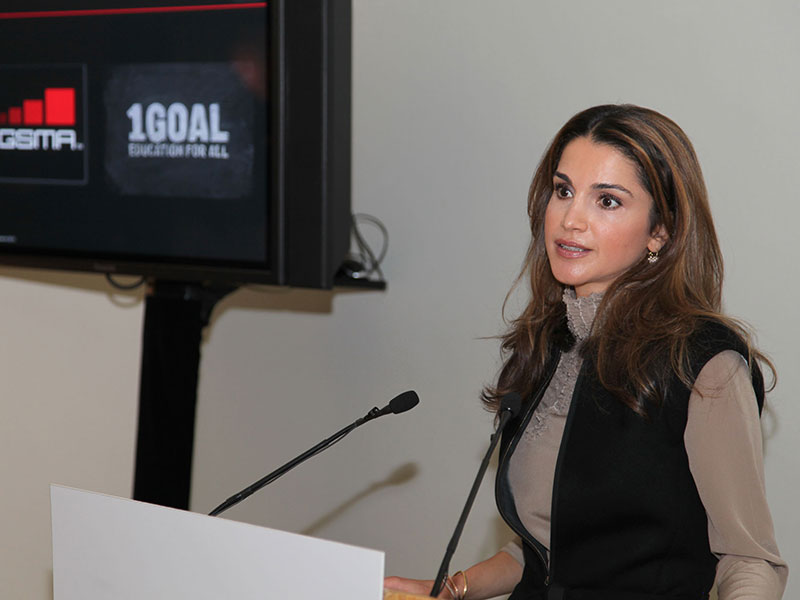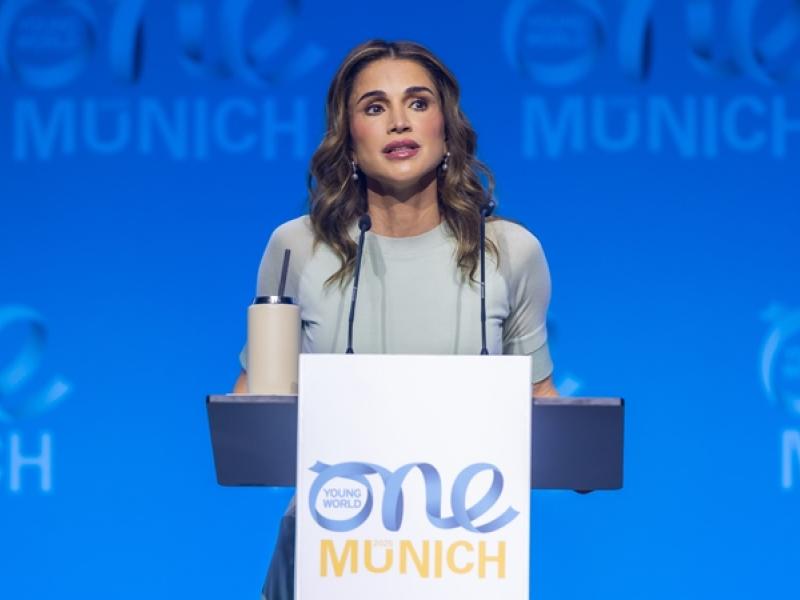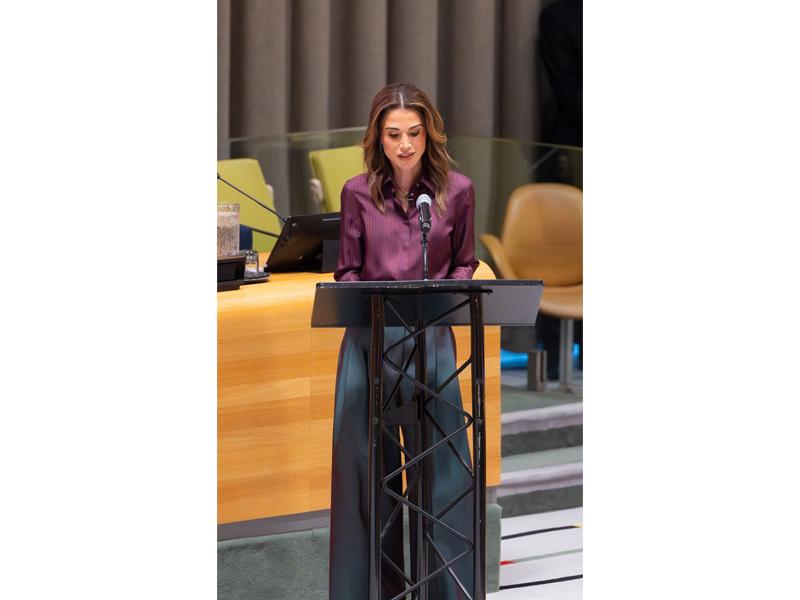Thank you very much, Rob; it feels good to be introduced by “the most influential man in telecoms” today. Like you, I’m thrilled about the promise of the premier league partnership of GSMA and 1GOAL, and I’ll be talking about that too, a bit later in my remarks.
But first, let me say how honored I am to be part of such a dynamic conference: as dynamic in scale and expertise… as it is in vision and innovation.
Enabling over 3 billion connections, and growing at a rate of over 1000 subscribers per minute, it’s no wonder that GSMA is the mobile industry’s leading institution.
In fact, your industry’s come a long way since 1876, when a Western Union internal memo stated:
“This 'telephone' has too many shortcomings to be seriously considered as a means of communication. The device is inherently of no value to us.”
I guess that guy never needed a pizza delivered!
Like you, I’m glad he was wrong. Because today, the mobile telephone is not just a means for talking, texting and keeping in touch…it’s not even just a means for sending email, sharing music and snapping photos. In recent weeks, we’ve seen mobile phones save lives.
In the aftermath of the Haiti earthquake, we saw mobile phone technology not only rally masses and raise money, but rescue survivors and reconnect loved ones.
Early in the aid effort, the American Red Cross received more than $9 million in donations from over 900,000 cell phone users. They simply texted “Haiti 90999” and had $10 deducted from their bill or credit. It was so quick, easy and low cost, it gave currency to the term, “slactivism” - the desire people have to do good without getting out of their chair.
Frankly, they can call it anything they like. People’s lives are being saved because of a pithy text message and a pioneering mobile phone industry. I think the people of Haiti appreciate that!
Last decade, as phone prices dropped, their reach expanded, especially in developing countries. In just ten years, Africa’s mobile subscribers have grown by over 1000%.
In fact, as a family’s income rises from $1 a day to $4 a day, their spending on telecoms increases –faster than spending on any other category.
Why? Because in rural communities, poverty pockets, and conflict zones, a phone line is a lifeline. And it’s dialing up social and economic reform. Who’d ever have thought that,
"The impact of mobile phones on the developing world would be as revolutionary as roads, railways and ports?”
Just look at South Africa…where health workers send texts reminding patients to take their medicine. Sri Lanka, where SMS offers a trading platform to help farmers sell their produce and create a forward market. And the m-money phenomenon; millions of poor people now have access to banking for the first time, paving the way for greater economic growth.
It’s estimated that just a 10% increase in mobile penetration can lead to a 0.8% increase in a country’s GDP. In short, the mobile phone is a pocket-powerhouse for boosting a country’s prosperity.
So, when it comes to finance, farming, or feeling fit and healthy, the potential of mobile phones has been revealed…but in the education sector, their potential has yet to be realized.
It’s an area where we need urgent attention; where we need to apply the best and brightest minds. And that’s why I’m here today.
Imagine the entire populations of New York City, Shanghai, Los Angeles and Tokyo …unschooled and unskilled.
72 million. That’s how many children are out of school around the world today.
72 million children who can’t point to where they live on a map, never mind operate a GPS…
72 million children who can’t read a text message on how to prevent malaria even if they had a phone… …
72 million children who can’t send an email because they’ve never learned to write a sentence.
Millions of children whose childhoods are permanently on hold.
All because they had the bad luck to be born into poverty and conflict; worlds where you have to choose between school fees and medicine…studying or slaving in a factory so you can buy bread.
Is that what being a global family is all about? Injustice and inequity for our children?
And yet, we know education’s a transformative force for good. In the face of disease, it can mean a clean bill of health; in an economic downturn, it can mean a skilled workforce ready to earn again; in a warzone, it can be the language of diplomacy and dialogue.
That’s why, in 2000, the global community pledged to put every child in primary school by 2015. But with five years to go, it looks like 56 million children will still be cast out of classrooms by our deadline.
Why? Because we can’t seem to find $16 billion a year to fill the financing gap for basic education in low income countries.
It must be hard for a little girl in Eritrea to understand why, by 2011, we’ll have spent $16 billion on mobile gambling and not spent it on giving her generation the chance to graduate school.
It must be hard for a mother in Kenya to understand why the US can spend between $40-$50 billion every year on weight loss programs and diet aids, but the world cannot find one third of that, $16 billion, to give her son an education …and the means to feed himself.
I don’t understand. Because we have the money. But, our political leaders don’t have the will or conscience to act.
They need to understand the urgency of this tragedy unfolding before us. They need to feel the eyes of the world on them. They need to hear our cries of indignation.
That’s what 1GOAL aims to do. 1GOAL is harnessing the power of FIFA and the Global Campaign for Education to get every child into school. In the run up to the World Cup in South Africa, we want millions of people to sign their names on an online petition to present to world leaders.
And I want to thank you, Rob, for your leadership and GSMA’s partnership in creating this campaign. I want to thank each and every one of you here today who has joined the 1GOAL team and who’ll reach out to subscribers with a message, an app, or a widget.
1GOAL is about people-power… the largest ever, never-before-done, cause-related campaign of its kind. We need all of you to flex your networks’ muscles and show how mega mobile communication can be. And I hope that those of you in the mobile eco-system who haven’t done so, will join up and sign up before our kick-off in April. But, for now, you deserve a round of applause.
But I’d like to think that GSMA’s involvement with children’s education doesn’t stop with 1GOAL; but rather that it starts with m-learning…
M-learning is ‘anytime, anywhere’ learning... like lessons delivered to your mobile phone... so that no matter where you are, you can study schoolwork virtually.
I’m not suggesting that m-learning can ever replace a teacher in a classroom... but about half of the 72 million out-of-school kids live in fragile and conflict-affected countries; the majority of them are in sub-Saharan Africa. They’re imprisoned by poverty...immobilized by insecurity... and beyond the reach of traditional education aid.
Their problems are magnified more than most. Take Musu…
I met Musu when she was nine. She’s from Liberia. She grew up in a conflict zone amidst poverty – devastation - unspeakable atrocities. She couldn’t go to school; she couldn’t learn to read or write; all she learned was how to survive. In the final days of the civil war, her hand was blown off in a rocket attack.
Musu’s in school now, but millions aren’t so lucky.
You have the power to transform the lives of children like Musu...through m-learning.
M-learning can offer opportunities to children too scared to leave their homes...to little girls who spend half the day finding water for their families...or little boys tilling the fields until darkness falls.
And, I know that some of you are already pioneering m-learning services in emerging markets. In Bangladesh, mobile operators offer three minute lessons for three cents. In Kenya, mobile operators have launched an app where kids can take quizzes in maths and science. And I know there are many other examples. But I want all of you to cast your coverage wider to the hardest to reach.
A wise man once said, “the future’s already here; it’s just unevenly distributed.” And that’s so true when it comes to m-learning. We don’t need the smartest, most expensive technology to create change.
We. Need. A. Lot. Of. Cheap. Phones. We need infrastructure in hard to reach places. And we need you to work together...to connect ALL our children to a network of knowledge and ensure them digital justice.
Digital justice. That’s what I want you to strive for.
And I’m delighted that m-learning has made it onto the GSMA agenda this year for the first time. So, in your session tomorrow –The Liberation of the Classroom -I want you to imagine and re-imagine the possibilities for m-learning. Throw out the rule book! Think phone-aid. Think phone-anthropy.
Imagine UN peacekeeping tanks whose ammunition is mobiles loaded with lessons…
Imagine looking up into the sky and seeing millions of cell-phones parachuting down to children in the most out-of-the-way places…
Imagine connection costs paid for by a global community committed to education for all.
And, Rob, if you’ll have me, I’ll come back next year to see the results of that session, and hear how industry leaders and operators have put their creativity, vision, and experience to work for the children of the developing world.
Because, I want you guys to be the institution that makes m-learning massive; and turns it into a force for dynamic educational impact.
And I want you to be the people who give our most vulnerable children, a teacher in their pocket, a classroom in their hand, and a future at their fingertips.
Thank you very much.



